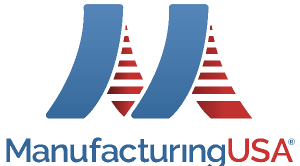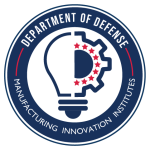Rapid Innovation Call – October 2022
Rapid Innovation Call seeks to address immediate and readily actionable needs identified by America Makes members. The Rapid Innovation Call will allow the Institute an agile framework to adapt to the evolving challenges of the supply chain via direct input from the membership.
AM processes frequently include a variety of mechanical, optical, and electrical systems which can influence material and product quality. Various operational features, material characteristics, and processing conditions present a wealth of opportunity for verifying an AM process is performing within a range of acceptance. Verification of modeling and monitoring methods for AM processes can be significantly influenced by outlying factors, such as process drift, and remains a persistent challenge. The objective of this topic is to develop a method to characterize and calibrate an AM process for a single material along with the associated data retention protocols which will significantly benefit those in the AM modeling and monitoring community.
Probabilistic analysis methods represent an opportunity to address the needs of the AM community for product qualification and certification. These analysis methods lend to quantifying defect occurrence, detection, and mitigation. In order to understand the benefits and limitations of these analysis methods, further evaluation is necessary. This topic looks to offer the membership an opportunity to assess and mature probabilistic analysis methods for the purpose of predicting probability of occurrence and detection, as well as effect on final part performance. Approaches in response to this topic may offer a means of quantifying risk analysis and process failure modes and effects analysis (PFMEA).
The unique combination of feedstock forms and energy sources used in DED offer a range of material and product benefits. America Makes continues to invest in the development and maturation of these important AM processes. There exists a need to understand how fabrication of sub-scale elements or coupons for DED processes relate to product performance and quality in a reliable and repeatable manner. Approaches in response to this topic shall include a quantitative analysis of factors which are known to influence product quality. Responses to this topic shall analyze specimen-property and part performance relationships while exploring factors which promote variation in thermal history, microstructure, and critical to quality properties (mechanical, physical, etc.) for different component geometries using a DED AM process. Material and part performance are influenced by microstructure and defect distributions arising from various phenomena occurring during fabrication.
Certification of safety-of-flight or critical applications represents a high value opportunity and substantial challenge for AM technologies. These applications may often require damage tolerancing and durability analysis which includes quantitative understanding of effects of defects. While many studies in recent years have shown various AM material flaws, not all of these flaws or discontinuities are defects. In the case of this discussion, defects are flaws or discontinuities which exhibit a validated and unacceptable effect on material or product quality when present in some form, location, morphology, or number density. Responses to this topic should demonstrate discontinuity or flaws effects on critical to quality metrics (such as mechanical or physical material properties) which verify these discontinuities are a known (validated) defect. Approaches should quantify the effects of the defect(s) in additively manufactured components or material with the goal of setting quantitative inspection (procedure and acceptance) criteria. It is desired that offerors deliver a specification which defines and quantifies limits on defect(s) to establish inspection, material, and process acceptance criteria. Outcomes of efforts proposed in response to this topic shall aim to accelerate the maturation of available and qualified inspection methods for AM materials and products. Discontinuities, flaws, and defects should be relevant to relatively higher criticality (unacceptable consequence of failure) components.
There remains a need for known and trusted methods to analyze and characterize AM machines for the purpose of AM machine qualification. The 2022 AMMO AM Workshop identified AM machine qualification as a high priority opportunity for research which will foster the development of datasets necessary for the eventual publication of normative standards. At present, there is a lack of understanding of measurement methods, tools, and techniques which afford AM operators and engineers necessary data and information to facilitate actionable data which can be paramount for AM machine qualification.
One-Step Proposal Process
The proposal process for this America Makes Project Call is a one-step process:
A full project proposal, as outlined in the RFP, is due by 5pm ET on Friday, November 18, 2022.
Resources
Industry Day Kick-off at TRX:
Registration Required
Call for Topics Kick-off Webinar VOD
AM Sub-Recipient Agreement – Rapid Innovation Call
Dates/Deadlines:
Announcement – Immediate Call for Topics
7/25/2022
Kickoff Webinar
8/1/2022
Due Date for Topics
8/26/2022
RMAG presentation to Executive Committee
9/27/2022
Project Call Announcement and Posting
10/13/2022
Industry Day Kickoff at TRX – Registration Required
10/19/2022
Questions from Proposers about Scope or Approach Due
10/24/2022
Responses to Proposers about Scope or Approach Due
(All questions and responses will be shared with all proposers below)
10/28/2022
Deadline for team members receiving federal award funding to be an America Makes member
11/4/2022
Fully Executed NDA with NCDMM (only if proposal contains proprietary information)
11/4/2022
Full Project Proposal Submission Due Date (Note: No Concept Paper Submission)
11/18/2022
Anticipated Decision and Notification of Project Proposal Teams
12/16/2022
Anticipated Date to have ALL Projects on Contract
1/1/2023
All project finalized reports and deliverables received no later than
8/1/2023
Frequently Asked Questions (FAQs)
Team members receiving federal funding must be America Makes members.
Yes, teams may submit more than one Project Proposal.
Questions should be emailed to ric@americamakes.us. Questions will be posted to the America Makes website according to the schedule. Questions asked AFTER the scheduled Q&A session will NOT be addressed.
Yes, but only if they are members. The approval process for foreign-owned entities can take up to 4 weeks to complete, so non-members would not have sufficient time to apply and be approved prior to this deadline.
Federal dollars cannot be spent outside of the United States. It is the Lead / team’s responsibility to ensure compliance with all applicable export control laws and regulations.
Yes. The proposals will only be reviewed by the evaluation team and each team member signs a confidentiality agreement.
The owning organization should list anything that they are leveraging that is not going to be made available to the membership at the completion of the project. This could be a patent number or a description of the background IP that is being leveraged.
The IP is owned by the organization that developed the IP, however that IP is subject to the rules outlined in the membership agreement.
Questions and Answers (Q&A)
Questions and Answers will be posted here on or before October 28.


